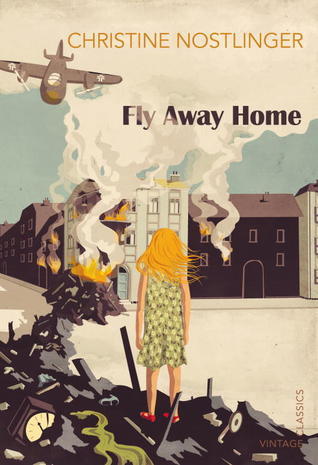What do you think?
Rate this book


208 pages, Paperback
First published January 1, 1973
Es war Krieg. Es war schon lange Krieg. Ich konnte mich überhaupt nicht daran erinnern, dass einmal kein Krieg gewesen war. Ich war den Krieg gewohnt und die Bomben auch. Die Bomben kamen oft.
The war was on; the war had been on for a long time now, and I could not even remember a time when the war had not been on. I was used to the war, used to the bombs, of which there were a great many.
Wir hatten die Hannitante nicht gesehen. Und wir sahen sie auch nie mehr. Sie lag oben, bei der Kalvarienberggasse, unter einem Schutthaufen. Ihr Mann grub sie aus. Hätte sie nicht das Klappstockerl unter dem einen Arm und die karierte Decke unter dem anderen Arm gehabt, hätte ihr Mann sie gar nicht erkannt, weil ihr Kopf fehlte.
No, we had not seen Auntie Hanni. We never saw Auntie Hanni again; she was lying in Kalvarienberggasse, buried under a heap of rubble. Her husband dug her out. But for the folding stool under one arm and the check rug under the other, he would not have known her, because her head was blown off.
Mein Vater hatte zerschossene Beine und überall auf seinem Körper eiterten Granatsplitter aus dem Fleisch. Doch er konnte mühselig herumhumpeln und er bekam jeden Morgen im Spital einen Urlaubsschein und durfte zu uns nach Hause kommen und bis zum Abend bei uns bleiben.
My father’s legs were riddled with shot, and there were shell splinters all over his body. However, he could manage to limp about, though with difficulty, and every morning he got a pass at the hospital and was allowed to come home to us and stay till evening.
»Die Russen schneiden Frauen die Busen ab und erschießen die Kinder und rauben die Häuser aus und zünden alles an und alle verbrennen«, sagte meine Schwester.
»Woher hast du denn den Blödsinn?«, fragte mein Vater.
Meine Schwester zuckte mit den Schultern. »Das sagen sie alle in der Schule. Die Turnlehrerin und die Kinder und die Frau Brenner, und beim BDM sagen sie es auch.«
Ich rief: »Mir hat es der Berger Schurli gesagt. Dem hat sein Onkel erzählt, dass die Russen die Frauen zerstückeln, und dann schmeißen sie sie in Fässer und salzen sie ein!«
‘The Russians cut off women’s breasts, and shoot children, and loot houses, and set fire to everything, and burn it all down,’ said my sister.
‘Who told you all that nonsense?’ said my father.
My sister shrugged her shoulders. ‘Well, that’s what everybody says at school. The gym mistress says so, and the other children, and Frau Brenner. They say so at the Bund Deutscher Mädchen too.’ The Bund Deutscher Mädchen was the Nazi youth organisation for girls.
‘Schurli Berger told me,’ I said. ‘And his uncle told him about the Russians cutting up some women into little bits – and they put the bits in tubs of brine and pickle them.’
Ich sagte – und dabei zitterte meine Stimme ein bisschen, weil meine Mutter mir streng verboten hatte, mit fremden Leuten darüber zu reden –, ich sagte: »Herr Wawra, die Juden, die kommen nicht wieder. Die hat der Hitler alle eingesperrt, ins Konzentrationslager! Die werden alle umgebracht! Alle!«
»Kind! Kind! Halt doch den Mund!«, flüsterte Herr Wawra.
»Red doch nicht so! So was sollen Kinder gar nicht wissen!«
»Ich weiß es aber«, erklärte ich, »weil ich einen Onkel habe, der ist bei der SS ein ganz Hoher, im Führerhauptquartier. Einmal hat er mit meiner Mutti über die Juden gestritten, und da hat er gesagt, die Juden, die gehen im Konzentrationslager alle durch den Rauchfang! Pfffttt, hat er gemacht, als er das gesagt hat!«
»Schöne Onkel hast du, pfui Deibel«, murmelte Herr Wawra.
My mother had strictly forbidden me to discuss such matters with anyone, so my voice trembled slightly as I said, ‘Herr Wawra, the Jews won’t be coming back. Hitler shut them up in concentration camps and they’re being killed, every single one!’
‘Hush, child, hush! Hold your tongue!’ whispered Herr Wawra. ‘Don’t talk like that! Children shouldn’t know about such things.’
‘But I do know,’ I said. ‘I’ve got an uncle in the SS, a real big shot. He’s at the Führer’s headquarters. He had a quarrel with my mother once about the Jews, and he said the Jews were all going up through the concentration camp chimneys. And when he said that he went “Ffft!”’
‘Nice sort of uncle you have, I must say!’ muttered Herr Wawra.
Mein Vater zeigte dem Herrn Major die kranken Beine. Er krempelte die Hosenbeine hoch und wickelte die alten Geschirrtücher, die er statt eines Verbandes um die Beine hatte, herunter.
Die Beine sahen scheußlich aus. Kein Mensch konnte noch erkennen, ob sie von russischen Granatsplittern zerschossen waren oder ob das Knochentuberkulose oder Lepra oder sonst was war. Auf den Beinen waren große, rote Beulen. Jede hatte in der Mitte ein kleines, gelbes Loch, das mit Eiter gefüllt war. Und die Haut zwischen den Beulen war dunkelblau und glänzend. Die Beine meines Vaters sahen aus wie verfaulte Zwetschken.
Then my father showed the Major his bad legs, rolling up the legs of his trousers and unwrapping the old teacloths he was using for bandages. His legs looked dreadful. By now it was impossible to tell whether they had been wounded by Russian shells or were the result of tuberculosis of the bone, or leprosy, or what. There were huge red sores on them, each with a small yellow hole in it, full of pus, and the skin between these sores was dark blue and shiny. My father’s legs looked like rotten plums.
